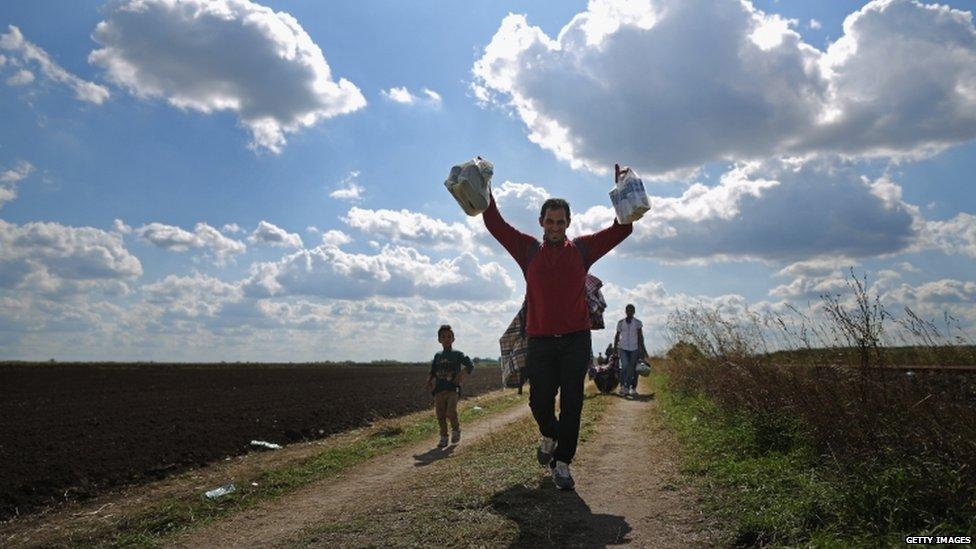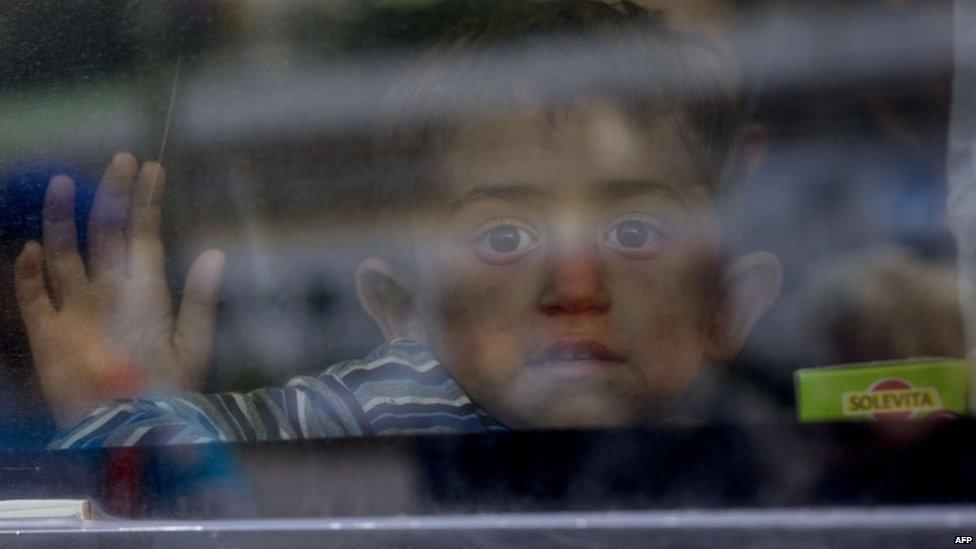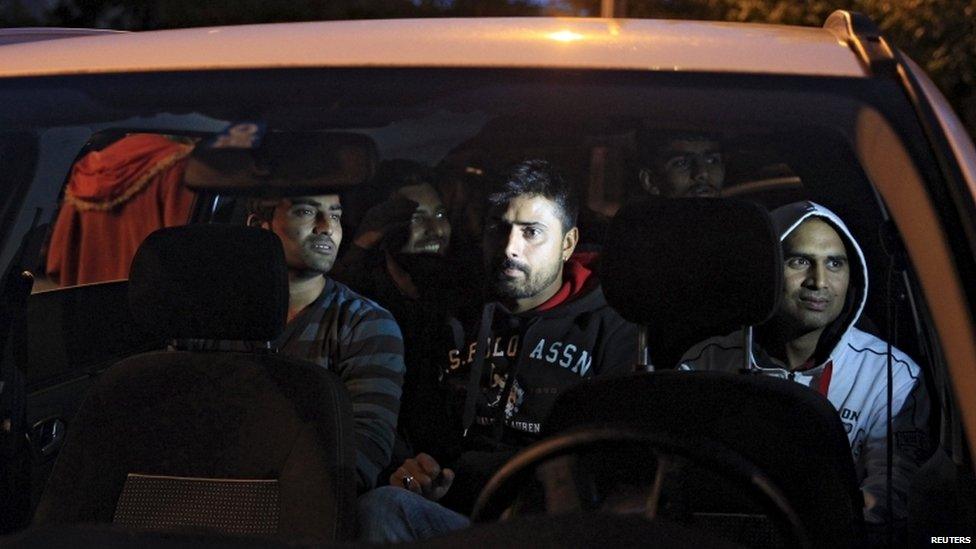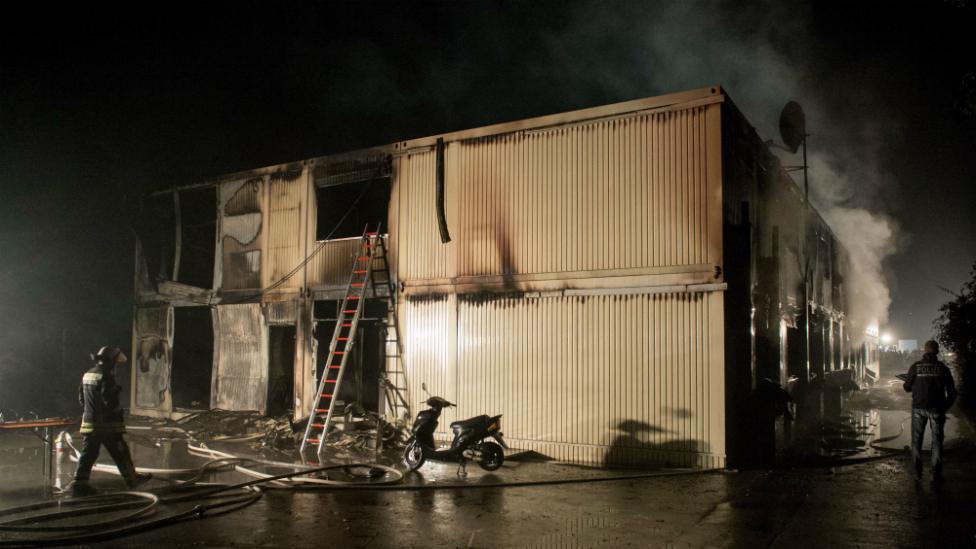Migrant crisis: Germany to release funds to help regions cope
- Published
A look back at 48 hours in Munich's railway station
Germany's coalition government has agreed to spend €6bn (£4.4bn) to support record numbers of migrants and other measures to deal with the influx.
Critics at home have accused Chancellor Angela Merkel of creating a dangerous precedent by opening Germany's borders.
About 18,000 migrants arrived over the weekend after an agreement with Austria and Hungary to relax asylum rules.
But Austria's Chancellor Werner Faymann has said the emergency measures must come to an end.
He said they would move step by step "towards normality", after speaking to Chancellor Merkel and the Hungarian Prime Minister Viktor Orban on Sunday.
Hungary had previously blocked migrants travelling to Western Europe, but dropped restrictions on Friday and shuttled people to the Austrian border.
German Chancellor Angela Merkel: ''It is time for the European Union to pull its weight''
The flow shows no sign of easing, with crowds still streaming across Hungary's border with Serbia. Officials in Germany say thousands more migrants are expected to arrive later.
'Migrants want German life'
Speaking on Monday, Mr Orban said "as long as we can't defend Europe's outer borders, it is not worth talking about how many people we can take in".
Mr Orban said those migrants trying to reaching Germany were seeking a "German life" not physical safety, adding that if the stream continued it would endanger Europe's "Christian welfare states".

Thousands took advantage of an easing of restrictions to travel towards Western Europe

An estimated 18,000 migrants reached Germany over the weekend

Some were driven by a volunteer convoy
Germany's announcement of extra funds came after talks on Sunday night between the two parties which make up Chancellor Merkel's coalition.
The government has agreed to give €3bn ($3.3bn; £2.2bn) to the federal states and local councils, with a further €3bn to fund federal programmes such as benefit payments.
Specific measures announced include:
A building programme to increase the number of places in reception centres for asylum seekers, suitable for winter months, to 150,000
An extra 3,000 federal police officers
Replacing cash allowances paid to asylum seekers in reception centres with benefits in kind
More money for integration and language courses
Kosovo, Albania and Montenegro will be added to the list of "safe" countries, meaning asylum seekers from those nations can be deported more rapidly
The agreement stressed the need for "solidarity" and "a fair distribution" of refugees between EU states.
Germany expects to receive 800,000 refugees and migrants this year, and wants to see the rest of Europe do more to help.
But while Mrs Merkel has become a hero to many migrants and their supporters, conservative allies said she sent a "totally wrong signal" by allowing in the intake from Hungary.
The interior ministry said the decision was an exception to help avert a humanitarian crisis.
New arrivals in Germany were welcomed by smiling and cheering members of the public at train stations across the country.

There was a fire at a housing site for refugees in western Germany on Sunday night
However, there were two fires overnight at accommodation centres for asylum seekers.
Five people were hurt in a fire at a centre in Rottenburg in the south-western state of Baden-Wuerttemburg; it is not known what caused it.
A second fire, at accommodation being renovated to house asylum seekers in Ebeleben in the central state of Thuringia, was caused by "politically motivated arson", police said.
Both states have seen a spate of arson attacks on asylum seekers' accommodation in recent weeks.

Syrians are the largest group travelling, followed by Afghans and Eritreans.
A rift has developed within the EU over how to deal with the crisis.
Hungary has accused Germany of encouraging the influx, and is pressing ahead with plans to tighten border controls and could send troops to its southern frontier if parliament agrees.
It has opened a new reception camp for migrants in the southern border village of Roszke, and is due to finish its border fence this month.
UN refugee chief Antonio Guterres said the crisis was "manageable" if member states could agree a joint plan.

A note on terminology: The BBC uses the term migrant to refer to all people on the move who have yet to complete the legal process of claiming asylum. This group includes people fleeing war-torn countries such as Syria, who are likely to be granted refugee status, as well as people who are seeking jobs and better lives, who governments are likely to rule are economic migrants.

Are you among those trying to reach Austria and Germany? Have you been involved in these events? Email haveyoursay@bbc.co.uk, external with your experience.
Please include a contact number if you are willing to speak to a BBC journalist. You can also contact us in the following ways:
Whatsapp: +44 7525 900971
Send pictures/video to yourpics@bbc.co.uk, external
Tweet: @BBC_HaveYourSay, external
Send an SMS or MMS to 61124 or +44 7624 800 100